When it comes to healthy skin, we often think of skincare products and routines. But did you know that certain foods can also play a crucial role in promoting a healthy skin glow?
Foods rich in melanin, a natural pigment responsible for skin color, eyes, and hair, can support melanin production in the skin and help maintain its health. Incorporating these melanin-rich foods into your diet can be a delicious and nutritious way to keep your skin’s radiance.
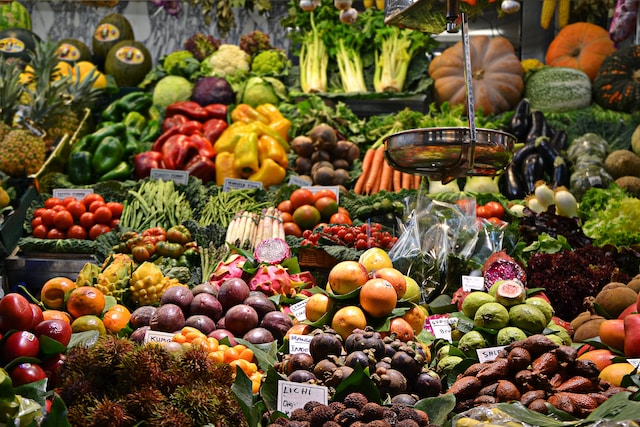
Here are some foods with high melanin content: dark leafy greens, such as kale and spinach, colorful berries, like blueberries and blackberries, nutritious nuts, like almonds and walnuts, and wholesome legumes, such as lentils and black beans.
In this article, we will explore the benefits of foods with high melanin content and provide you with some of the top melanin-rich foods you can easily incorporate into your daily diet. So, get ready to tantalize your taste buds and boost your skin health with these melanin-rich food choices!
Benefits of Melanin-rich Foods
Incorporating melanin-rich foods into your diet can have numerous benefits for promoting a healthy skin glow. Here are some key advantages of consuming foods that are high in melanin:
1. Enhanced Melanin Production
Melanin-rich foods can help support the production of melanin in the skin. Melanocytes, the specialized cells that produce melanin, rely on certain nutrients found in food to function optimally.
Consuming foods that are rich in melanin, such as dark leafy greens, colorful berries, nuts, and legumes, can provide the necessary nutrients that melanocytes need to produce melanin effectively.
This can help promote healthy melanin levels in the skin, which in turn can enhance skin protection against UV radiation and contribute to a radiant skin complexion.
2. Increased Skin Protection
Melanin acts as a natural sunscreen, protecting the skin from the harmful effects of UV radiation from the sun. Melanin absorbs UV rays and helps prevent them from penetrating deeper into the skin, which can reduce the risk of DNA damage, premature aging, and skin cancer.
By incorporating melanin-rich foods into your diet, you can help support the skin’s natural defense against UV radiation and enhance its ability to protect itself from sun damage.
3. Anti-aging Properties
Melanin has antioxidant properties that can help neutralize harmful free radicals in the skin, which are molecules that can damage skin cells and contribute to premature aging.
By consuming foods rich in melanin, you can increase your antioxidant intake and support your skin’s defense against free radicals, which can help maintain a youthful and healthy skin appearance.
4. Nutrient-rich Diet
Melanin-rich foods are typically packed with essential nutrients that are beneficial for overall skin health. Dark leafy greens, colorful berries, nuts, and legumes are all nutrient-rich foods that provide vitamins, minerals, and antioxidants that are important for maintaining healthy skin.
By incorporating these foods into your diet, you can ensure that your body is receiving the necessary nutrients to support optimal skin health, including melanin production.
5. Diversity in Diet
Consuming melanin-rich foods can also add diversity to your diet, which is important for overall health and well-being.
By incorporating a variety of foods with high melanin into your diet, you can ensure that you are getting a wide range of nutrients that are beneficial for not just your skin but also your overall health.
In the next section, we will explore the top 10 foods rich in melanin for skin that you can easily incorporate into your daily diet for a healthy skin glow.
Related Article: Top 7 Foods That Increase Hemoglobin Levels Naturally
Top 10 Foods Rich In Melanin for Healthy Skin
Including foods with high melanin in your diet can be a delicious and effective way to promote healthy skin. Here are the top 10 foods that are naturally rich in melanin and can help you achieve a glowing complexion:
1. Dark Leafy Greens
Dark leafy greens, such as spinach, kale, and collard greens, are known to be a rich source of melanin. Melanin in these greens acts as a natural pigment that helps protect the skin from harmful UV radiation and oxidative stress.
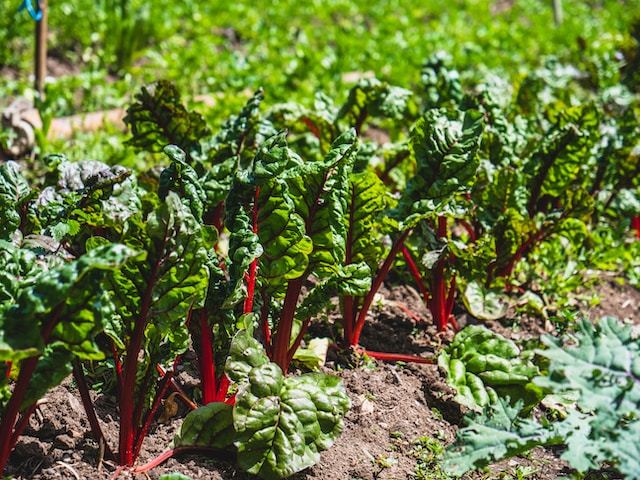
Additionally, dark leafy greens are packed with other essential nutrients like vitamins A, C, and E, as well as minerals like iron and calcium, which are important for overall skin health.
Including dark leafy greens in your diet can provide your skin with the necessary nutrients and melanin to promote a healthy and radiant complexion.
2. Colorful Berries
Berries like blueberries, strawberries, and blackberries are not only delicious but also considered fruits rich in melanin. These berries are packed with antioxidants, including anthocyanins, which can help protect the skin from oxidative stress and promote a youthful appearance.
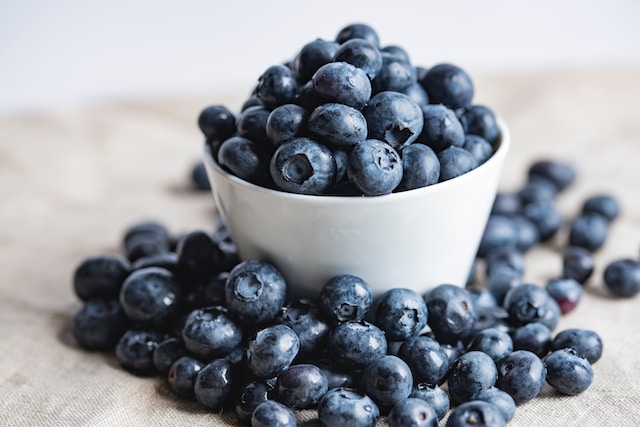
Anthocyanins, along with the melanin content, work together to support healthy skin by neutralizing free radicals, reducing inflammation, and promoting collagen production. Including colorful berries in your diet can give your skin a natural boost of melanin and antioxidants, helping maintain healthy, glowing skin.
Related Article: 30 Days Keto Diet Plan: Best Way To Minimize Excess Weight
3. Nuts and Seeds
Nuts and seeds, such as almonds, walnuts, flaxseeds, and sunflower seeds, are nutrient-dense foods rich in melanin for skin health. These foods are excellent sources of essential fatty acids, including omega-3 and omega-6 fatty acids, which play a crucial role in maintaining healthy skin.
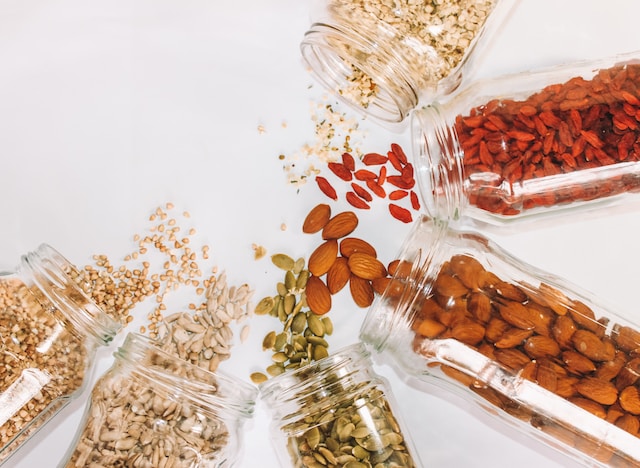
Omega-3 fatty acids, in particular, have anti-inflammatory properties that can help reduce skin inflammation and redness, promoting a smoother and clearer complexion. Additionally, nuts and seeds are packed with vitamins and minerals, such as vitamin E, zinc, and selenium, which are known to support skin health and protect against oxidative damage.
4. Legumes
Legumes, such as lentils, chickpeas, and black beans, are a great source of plant-based protein and other essential nutrients, including melanin, which can help promote healthy skin.
Melanin found in legumes acts as a natural pigment that can help protect the skin from UV radiation and oxidative stress, reducing the risk of skin damage and premature aging.
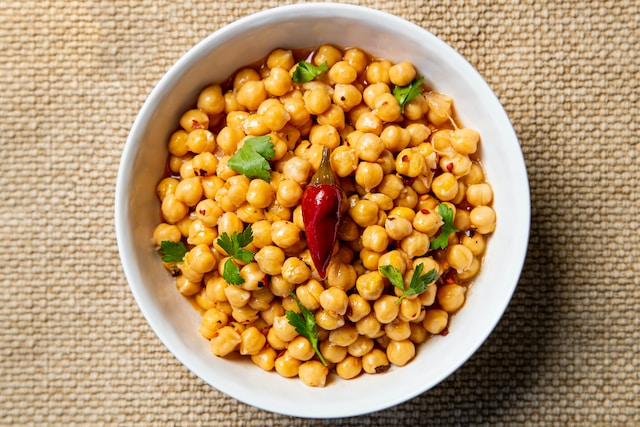
Legumes are also rich in fiber, vitamins, and minerals, such as folate, iron, and zinc, which are important for maintaining optimal skin health. Adding legumes to your diet can provide your skin with the necessary nutrients, including melanin, to support a healthy and youthful complexion.
So, if you’re wondering what can I eat to increase melanin, incorporating legumes into your diet can be a beneficial choice for your skin.
5. Whole Grains
Whole grains, such as brown rice, quinoa, and oats, are a nutritious source of complex carbohydrates, fiber, and other essential nutrients that can promote healthy skin, including melanin.

Melanin in whole grains acts as a natural pigment that can help protect the skin from UV radiation and oxidative stress, reducing the risk of skin damage and premature aging.
Whole grains are also rich in B vitamins, such as niacin and riboflavin, which play a crucial role in maintaining healthy skin.
Niacin helps improve the skin’s barrier function, keeping it hydrated and protected, while riboflavin supports the production of collagen, a protein that gives skin its elasticity and firmness.
6. Fish
Fish, such as salmon, mackerel, and trout, are excellent sources of omega-3 fatty acids, which are beneficial for skin health, including melanin production. Omega-3 fatty acids are essential fats that cannot be produced by the body and must be obtained from the diet.
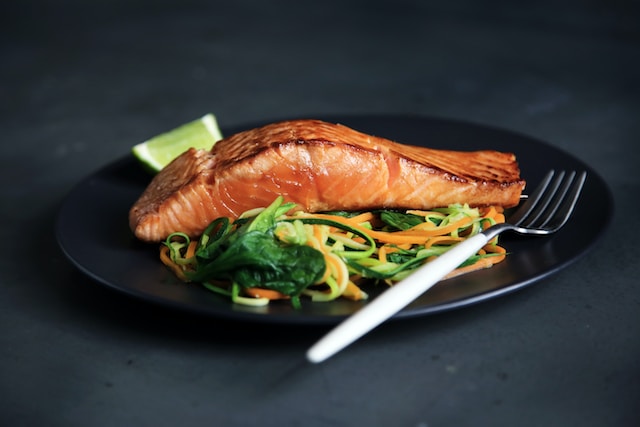
These healthy fats play a crucial role in maintaining the integrity of cell membranes, including those of the skin cells, and help regulate inflammation in the body, which can affect skin health.
Omega-3 fatty acids also support the production of melanin, the pigment that provides color to the skin and protects it from UV radiation
7. Eggs
Eggs are a nutrient-rich food that can benefit not only your overall health but also for healthy hair. Eggs are packed with protein, vitamins, and minerals, including melanin, which can support healthy hair growth.
Melanin in eggs acts as a natural pigment that gives color to the hair and helps protect it from environmental damage, such as UV radiation and oxidative stress. Eggs are also a rich source of biotin, a B vitamin that is known to promote hair health and prevent hair loss.

Biotin helps strengthen the hair shaft, reducing breakage and promoting healthy hair growth. Additionally, eggs contain other essential nutrients like vitamin D, vitamin E, and zinc, which are important for maintaining optimal hair health.
Including eggs in your diet can provide your hair with essential nutrients, including melanin, to support strong, shiny, and healthy hair and glowing skin. So, if you’re looking for foods rich in melanin for healthy hair and skin, adding eggs to your diet can be beneficial.
8. Mushrooms
Melanin in mushrooms acts as a potent antioxidant that helps neutralize harmful free radicals in the skin, reducing oxidative stress and preventing premature aging.
Additionally, mushrooms are rich in vitamins and minerals, such as vitamin D, selenium, and copper, which are essential for maintaining optimal skin health. Vitamin D is important for skin cell growth and repair, while selenium and copper are antioxidants that can help protect the skin from damage caused by environmental factors.
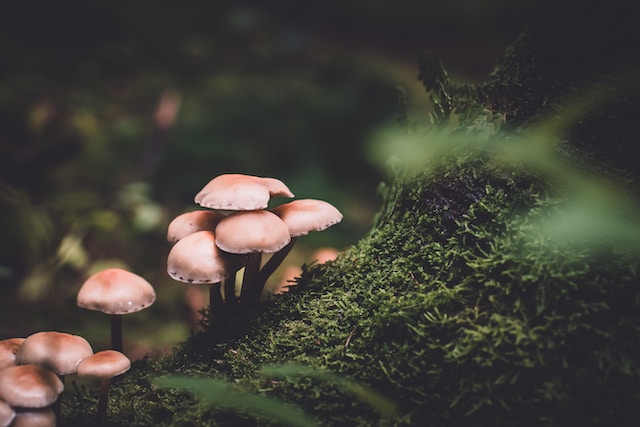
Mushrooms also contain beta-glucans, a type of fiber that has immune-boosting properties and can help promote overall skin health.
9. Dark Chocolate
Dark chocolate is not only a delicious treat but also a potential boon for your skin health. Dark chocolate is rich in antioxidants, including flavonoids, which have been shown to have various health benefits, including promoting healthy skin.

Flavonoids in dark chocolate help protect the skin from oxidative stress caused by free radicals, which can lead to premature aging and skin damage. Dark chocolate also contains melanin, the pigment that provides color to the skin and helps protect it from UV radiation.
Melanin in dark chocolate acts as a natural sunscreen, shielding the skin from harmful UV rays and reducing the risk of sunburn and skin damage.
Additionally, dark chocolate has been found to improve skin hydration, increase blood flow to the skin, and boost collagen production, which can help improve skin elasticity and reduce the appearance of wrinkles.
However, it’s important to consume dark chocolate in moderation as it is high in calories and sugar. Opt for dark chocolate with a higher cocoa content and minimal added sugars for maximum skin benefits.
10. Spices
Spices not only add flavor to your meals but can also offer potential skin health benefits due to their high melanin content. Several spices are known to be rich sources of melanin.
Spices such as cinnamon, turmeric, and black pepper contain melanin, which acts as an antioxidant and helps neutralize harmful free radicals in the skin, reducing oxidative stress and preventing premature aging.
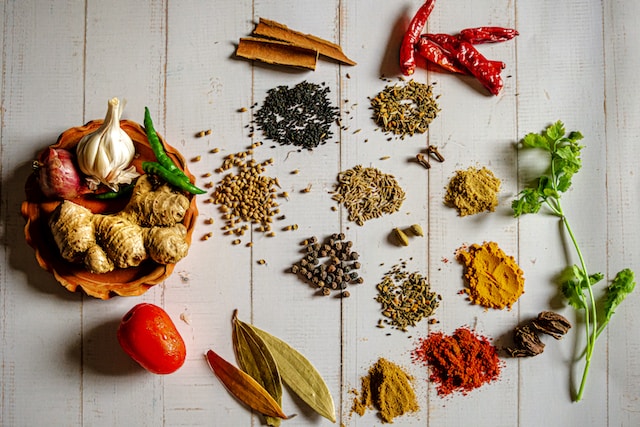
Additionally, these spices are also rich in other beneficial compounds, such as vitamins, minerals, and antioxidants, that can promote overall skin health.
For instance, turmeric contains curcumin, a powerful antioxidant with anti-inflammatory properties that can help reduce skin inflammation and improve skin tone.
Cinnamon is known for its antibacterial properties that can help fight acne-causing bacteria and promote clearer skin. Black pepper contains piperine, a compound that can enhance the absorption of other nutrients, including melanin, and boost their effectiveness.
How to Incorporate Foods with High Melanin into Your Diet
Incorporating melanin-rich foods into your diet is easy and can be done through simple meal planning and recipe ideas. Here are some practical tips to help you include these beneficial foods in your daily meals:

Plan your meals: Make a grocery list that includes melanin-rich foods such as dark leafy greens, colorful berries, nuts and seeds, legumes, whole grains, fish, eggs, mushrooms, dark chocolate, and spices. Incorporate these foods into your meal planning and ensure you have them on hand when you’re preparing your meals.
Experiment with recipes: Try out new recipes that feature melanin-rich foods as key ingredients. For example, you can make a spinach and mushroom omelette for breakfast, a mixed berry and nut salad for lunch, or a grilled salmon with whole grain rice and roasted vegetables for dinner. Look for recipes that include these foods and get creative in the kitchen to make delicious and nutritious meals.
Opt for snacks with melanin-rich foods: Choose snacks that are rich in melanin, such as mixed nuts and seeds, fresh berries, or a small piece of dark chocolate. These can be excellent options for satisfying your hunger between meals while also providing your body with beneficial melanin.
Pay attention to portion sizes: While melanin-rich foods can be beneficial for your skin, it’s important to consume them in appropriate portions. Too much of any food, even healthy ones, can lead to excess calorie intake and potentially negate the health benefits. Follow portion size recommendations and avoid overconsumption.
Incorporate variety: To ensure you’re getting a diverse range of nutrients, including melanin, aim to incorporate a variety of melanin-rich foods into your diet. This will help you get a wide range of nutrients that can contribute to overall skin health.
By incorporating melanin-rich foods into your diet on a regular basis, you can support healthy skin and promote a natural glow. Experiment with recipes, plan your meals and pay attention to portion sizes to optimize the benefits of these foods for your skin health.
Other Ways to Support Melanin Production in the Skin
In addition to incorporating foods rich in melanin into your diet, there are other lifestyle factors that can support melanin production in the skin. Here are some tips to help you maintain healthy skin overall:
Sun protection: Protecting your skin from excessive sun exposure is crucial for melanin production. UV rays from the sun can damage the skin and inhibit melanin production, leading to skin pigmentation issues. Make sure to wear protective clothing, use sunscreen with at least SPF 30, and seek shade during peak sun hours to protect your skin from harmful UV rays.
Hydration: Proper hydration is essential for healthy skin, including melanin production. Drink plenty of water throughout the day to keep your skin hydrated and maintain its natural moisture barrier. This can help support the skin’s ability to produce melanin and maintain its health and appearance.
Sleep: Getting enough restful sleep is vital for overall skin health, including melanin production. During sleep, the body repairs and rejuvenates the skin cells, which can help support melanin production. Aim for 7-9 hours of quality sleep each night to give your skin the opportunity to regenerate and maintain optimal health.
Skincare routine: Establishing a regular skincare routine can help support melanin production and overall skin health. Cleanse your skin gently, exfoliate regularly to remove dead skin cells, and moisturize to keep your skin nourished and hydrated. Use skincare products that are appropriate for your skin type and address specific skin concerns, and protect your skin from environmental factors that can damage melanin production.
Avoid harmful habits: Smoking and excessive alcohol consumption can negatively impact melanin production and overall skin health. Smoking can damage the skin’s collagen and elastin, leading to premature aging and pigmentation issues. Excessive alcohol consumption can dehydrate the skin, disrupt sleep patterns, and affect melanin production. Avoiding these harmful habits can help support melanin production and maintain healthy skin.
By incorporating these lifestyle factors, in addition to foods with high melanin, into your daily routine, you can support melanin production in your skin and promote healthy, radiant skin. Remember to protect your skin from the sun, stay hydrated, get enough sleep, follow a regular skincare routine, and avoid harmful habits for optimal skin health.
Expert Advice on Melanin-rich Foods
Final Words
In conclusion, incorporating foods rich in melanin into your diet can play a significant role in promoting a healthy skin glow. Melanin-rich foods are packed with essential nutrients that can support melanin production, which is crucial for maintaining optimal skin health and appearance.
By including foods such as dark leafy greens, colorful berries, nuts and seeds, legumes, whole grains, fish, eggs, mushrooms, dark chocolate, and spices in your diet, you can provide your body with the necessary nutrients to support melanin production and promote healthy, radiant skin.
Remember, a healthy skin glow starts from within, and by nourishing your body with melanin-rich foods and adopting a holistic approach to skincare, you can support melanin production and achieve healthy, radiant skin that glows from the inside out. Your skin deserves the best care, so take action today to enhance its natural beauty!
Suffering from skin problems? Book for Dermatologist’s Appointment near you.
References
- “Melanin: The Pigment That Protects Our Skin from the Sun.” Skin Cancer Foundation. Available at: https://www.skincancer.org/blog/melanin-the-pigment-that-protects-our-skin-from-the-sun/
- “Role of Melanin in Skin.” International Journal of Molecular Sciences. Available at: https://www.ncbi.nlm.nih.gov/pmc/articles/PMC6463195/
- “Melanin-Rich Foods: Can They Boost Your Natural Sun Protection?” Cleveland Clinic. Available at: https://health.clevelandclinic.org/melanin-rich-foods-can-they-boost-your-natural-sun-protection/
Frequently Asked Questions
What are melanin-rich foods?
Foods with high melanin include dark leafy greens, colorful berries, nuts and seeds, legumes, whole grains, fish, eggs, mushrooms, dark chocolate, and spices.
How does melanin benefit the skin?
Melanin is a pigment that gives color to the skin, hair, and eyes. It helps protect the skin from the harmful effects of ultraviolet (UV) radiation from the sun by absorbing and scattering UV rays, thereby reducing the risk of sunburn and other sun-related skin damage.
How can I incorporate melanin-rich foods into my diet?
There are several ways to incorporate melanin-rich foods into your diet. You can add dark leafy greens to your salads or smoothies, snack on colorful berries, include nuts and seeds in your meals or as a topping for yogurt or oatmeal, cook with legumes and whole grains, include fish and eggs in your meals, add mushrooms to stir-fries or soups, enjoy dark chocolate in moderation, and use spices in your cooking.
How often should I consume melanin-rich foods for optimal results?
The frequency of consuming melanin-rich foods can vary depending on individual dietary preferences and health goals. It is generally recommended to aim for a balanced and varied diet that includes a wide range of nutrient-rich foods, including melanin-rich foods.
Are foods rich in melanin a substitute for sun protection?
No, melanin-rich foods are not a substitute for sun protection. While consuming melanin-rich foods can support melanin production in the skin and provide antioxidant benefits, they are not a replacement for proper sun protection measures.
How can I increase melanin naturally?
Foods that are rich in copper, such as nuts, mushrooms, and meat liver, can promote follicular melanin synthesis, supporting healthy hair. Additionally, incorporating sources of vitamin A, C, and E into your diet, such as carrots, papaya, eggs, citrus fruits, sunflower seeds, almonds, peanuts, and pistachios, can contribute to improved hair health.
What happens if melanin is low?
If melanin levels are low, it can result in reduced skin pigmentation, increased sun sensitivity, higher risk of skin cancer, and potential changes in eye and hair color.
